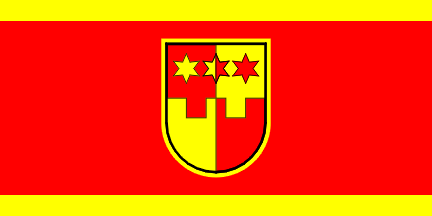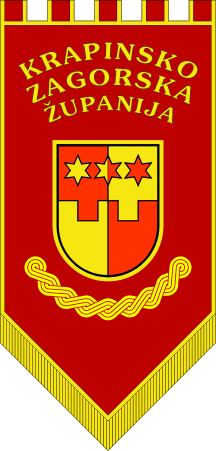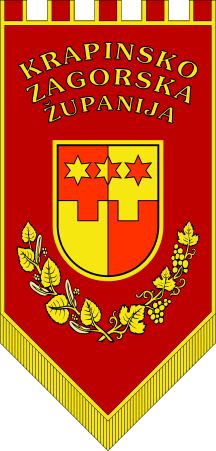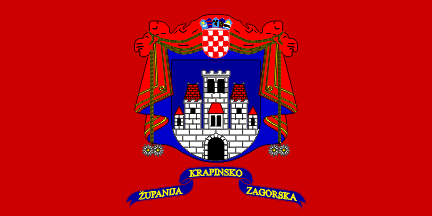
image by Željko Heimer, 8 October 2000

Last modified: 2006-02-05 by dov gutterman
Keywords: krapina | zagorje | croatia | county | krapinsko-zagorska | zupanija | ivancica | daisy |
Links: FOTW homepage |
search |
disclaimer and copyright |
write us |
mirrors

image by Željko Heimer, 8 October 2000
See also:
Cities:
Communities:
Other Sites:
I just received mail from Krapinsko-zagorska zupanija,
confirming that they have recently adopted a new flag, as
indicated on Janko
Ehrlich's site. They are expecting this flag to be approved
by central administration
Željko Heimer, 10 March 2000
The flag is red with yellow stripes allong upper and lower
edge (width 1/10 of hoist each). In the middle there is the Coat
of Arms bordered yellow. Ratio 1:2. Adopted: 21 December 1999.
One should note that there are three different shades of red used
in those flags, maybe to visualise possible difference of the
materials used (?) :
CMYK 0 80 100 0 - red fields in Coat of Arms
CMYK 10 100 100 0 - red field of the flag
CMYK 20 100 100 5 - red field of The Ceremonial
Flag
Yellow is in all flags the same Pantone Process Yellow (that's
CMYK 0 0 100 0). But on the ceremonial flag for the linden fruit
are used other two shade Pantone 122 CV (for "berries")
and Pantone 1205 CV (for the "leaf").
Željko Heimer , 24 March 2000

image by Željko Heimer, 8 May 2004
The ceremonial flag is gonfalon with triangual ending, five
sleave rectanges at the top, red bordered with yellow and with
yellow fringe along the lower sides. In the middle is the Coat of
Arms bordered yellow, above it arched inscription bearingh the
name of the community in three lines, below two yellow branches -
a vine with grapes and a linden branch with it's fruit.
Approximate ratio 1:2.
Željko Heimer, 24 March 2000
Above you can read on the ceremonial flag of the Krapina-
Zagorje County as it is described in the original documentation.
However, at least since 2002 there were reported in use table
flags that were different from that design, namely instead of the
branches below the coat of arms, they have an arc of the tripple
wattle.
I believe that until now it was not confirmed weather the real
unique ceremonial flag was also done with the wattle arc, or if
only the table flags are made so.
Željko Heimer, 8 May 2004
There are two reported version of the ceremonial flag of the
County. I just received a definitive confirmation that the one
with the wattle is the one in use and the one with the branches
apparently was never produced. A photo in local magazine Zagorski
list, br.34, 9 June 2004. shows the three flags on display in the
Krapina-Zagorje County Assembly Hall - the middle one is the flag
of Croatia, to its right (viewer's left) is the ceremonial flag
of the county and on the other side is the ceremonial flag of the
city of Krapina. I believe that such display of two ceremonial
flags together is rather unusual, probably the two share the same
assembly hall.
It may be interesting to note that the two flags side by side on
the photo clearly show different rectangular sleaves in the upper
edge. I do not find any specialy meaning in that, but just an
observation.
Željko Heimer, 11 June 2004
There is a decision titled: Odluka o izgledu svecane zastave
Krapinsko-zagorske županije, Krapina, 17. prosinca 1999. Kl:
021-04/99-01/168, Urbr. 2140/1-01-99- 1. The decision made
at the same time when the new 1999 design of the county flag was
made, determines the design of the ceremonial flag as well.
Unlike the ceremonial flag that was at first planned, with two
branches below the coat of arms, the design including the arched
wattle was adopted. Tomislav Šipek already pointed to
me that the table flags are made in the pattern with an arc of
the tripple wattle. I have had that info before the congress in
Stockholm, but after I have sent the final text to the editor.
Therefore I have shown this, what I considered a variation then,
on my presentation in Stockholm, but this is not included in the
proceedings. also, I believe that I have published the errorneous
design in some other publications before that also.
Afterwards, Tomislav confirmed that not only the table flags are
made without the branches, but the real ceremonial flag as well.
I finally found a document to support that. The flag with
branches is thus just an unadopted proposal after all.
Željko Heimer, 18 December 2004
Unadopted Proposal

image by Željko Heimer , 24 March 2000
kr.gif)
image by Željko Heimer, 8 October 2000

image by Željko Heimer, 8 October 2000
The Coat of Arms of Krapina-Zagorje is variation of the Coat
of Arms of Krapina city, surrounded with the heraldic tent,
"crowned" with the full Coat of Arms of Croatia. There
is no crown here, but surely the state Coat of Arms is
unapproprate here, and certainly forbiden by the law(s). The flag
reported in use is red with Coat of Arms in the middle. No info
on adoption or approval.
The County of Krapina - Zagorje is situated north of Zagreb,
towards Slovenian border. The area is considered as a typical
rural surrounding of the capital, although it is industrialized,
mostly with light industry. On numerous hills there are many
medieval and baroque castles and parks, and the coat of arms is
therefore rightly chosen. There is a core of one of the three
main Croatian dialects there, called 'kaykavian' (kajkavski).
Željko Heimer, 21 October 1998
Adopted around 1995, never approved by the Ministry of
Administration, inspite in de facto use, abandoned December 1999.
This was the horizontal variant, rarely in use.
Željko Heimer, 8 October 2000

image by Željko Heimer, 8 October 2000
Ceremonial, vertical flag of Krapina-Zagorje County,
199x-1999. Often used.
Željko Heimer, 8 October 2000
kr9x.gif)
image by Željko Heimer, 8 October 2000
Question to flower experts - name a small field flower haing
yellow seeds and small pointed white pettals. In Croatian they
are called "ivanc<ica", clearly connected with
deminutive feminin form of the name "Ivan" (John). I
guess that it is not only the Croatian "stereotype"
that these flowers are used often by young gilrs for making
girdles playing fairy queens and similar.
In any case, when we get the name of the flower - it is that
flower that is shown as four things that hangs from the heraldic
mantly in the former (and never approved) coat of arms of
Krapina-Zagorje county. Those flowers were chose for canting
reasons to remind on the mountain of the same name (Ivanc<ica)
that dominates the County landscape.
Željko Heimer, 10 September 2000
They look to me very much like what we call daisies. They are
a widespread wildflower in America (and probably elsewhere) and
often used by small children here as ornaments.
Al Kirsch, 10 September 2000
I agree with Al's identifiaction, even if it causes me some
linguistical-botanical trouble. Daisy seems to be used in English
both for big and small daisy-like flowers, which belong to two
different botanical species:
- the "big" daisy, Leucanthemum vulgare in Latin,
marguerite in French.
- the "small" daisy, Bellis perennis, paquerette in
French.
The "big" daisy is involved in the game
"effeuiller la marguerite" (litt. to pick the petals
off the daisy), a "she loves me - she loves me not"
game. Every picked petal is associated with a special level of
expected love (from "not at all" to "madly").
The level corresponding to the last petal tells what can be
expected. The game is difficult to play with "small"
daisies, because their petals are too small.
Botanically , daisy flowers are not "flowers" but
"composite inflorescences", specifically called
"capitules" ("small heads in Latin"). The
name of this flower family (including dandelion, artichoke,
cornflower, salsify, thistles ...) was Composaceae, until the new
Botanical Code changed it to Asteraceae (association with a
genius name is now mandatory, so forgot the Graminaceae and other
Cruciferaceae). Both the white "petals" and the yellow
"seeds" of the inflorescence are in fact true flowers,
and the inflorescence is made of hundreds of them. The white
"petals" are in fact the petals of the outer flowers (a
singel petal for each flower), whereas the inner yellow flowers
do not have petals.
Ivan Sache, 10 September 2000
I agree, these are properly known as asters, maybe because
they look like stars?
John S. Ayer, 11 September 2000